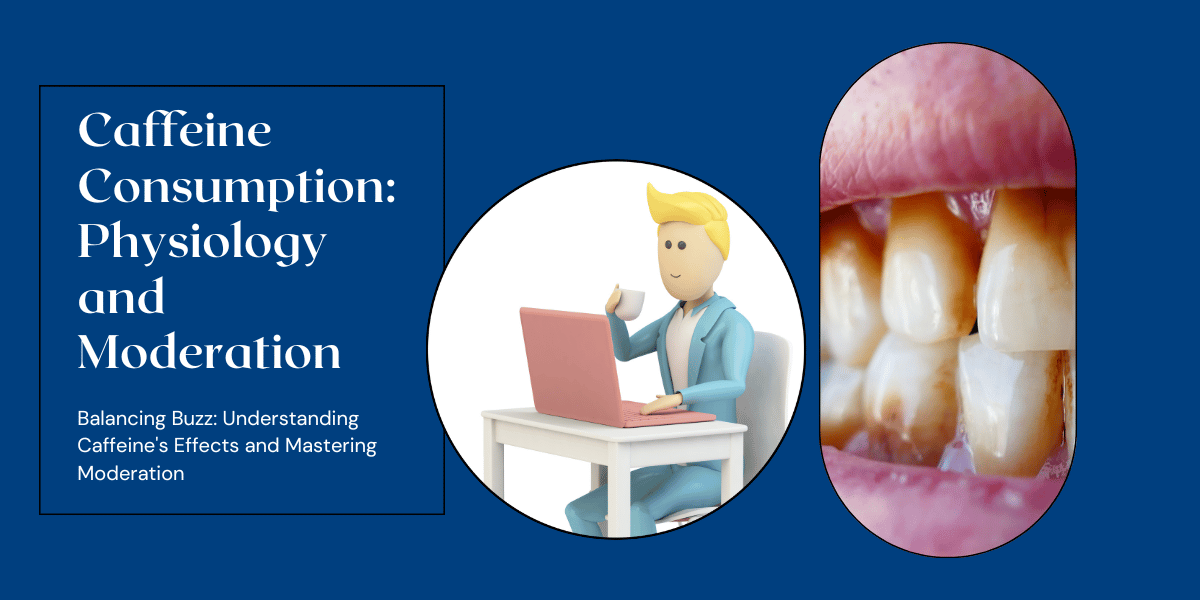Caffeine Consumption: Physiology and Moderation
Balancing Buzz: Understanding Caffeine's Effects and Mastering Moderation
Caffeine Consumption: Physiology and the Art of Moderation
Caffeine, the world’s most widely consumed psychoactive substance, is deeply ingrained in our daily lives. From morning rituals to midday pick-me-ups, caffeine has become an integral part of our routine. But what exactly happens when we consume caffeine, and how can we ensure its effects are beneficial rather than detrimental? Understanding the physiology behind caffeine consumption and mastering the art of moderation is key to harnessing its potential without falling victim to its drawbacks.

The Physiology of Caffeine:
Caffeine, a natural stimulant found in coffee, tea, and various other beverages and supplements, works by blocking the action of a neurotransmitter called adenosine in the brain. Adenosine promotes sleep and relaxation; caffeine, by inhibiting its effects, enhances alertness and reduces the perception of fatigue. Moreover, caffeine stimulates the release of certain neurotransmitters like dopamine and norepinephrine, contributing to increased focus and improved mood.
The Benefits of Moderate Caffeine Consumption:
- Enhanced Mental Alertness: Caffeine’s ability to block adenosine receptors leads to improved cognitive function, heightened concentration, and faster reaction times.
- Physical Performance: Caffeine increases adrenaline levels, preparing the body for physical exertion. This, in turn, enhances endurance and strength during exercise.
- Mood Enhancement: The stimulation of neurotransmitters like dopamine not only improves mood but also contributes to reduced risk of depression and may enhance overall feelings of well-being.
- Reduced Risk of Certain Diseases: Moderate caffeine intake has been linked to a decreased risk of various diseases, including Parkinson’s, Alzheimer’s, and certain types of cancer.
The Pitfalls of Excessive Consumption:
While moderate caffeine consumption offers numerous benefits, excessive intake can lead to negative outcomes:
- Insomnia and Disrupted Sleep: Caffeine’s stimulant properties can interfere with sleep patterns, leading to difficulty falling asleep and staying asleep.
- Increased Heart Rate and Blood Pressure: Excessive caffeine can cause palpitations and hypertension, potentially leading to cardiovascular issues.
- Anxiety and Nervousness: High doses of caffeine may exacerbate anxiety symptoms, leading to restlessness and nervousness.
- Dependency and Withdrawal: Regular consumption can lead to physical dependence, with withdrawal symptoms such as headaches and irritability upon cessation.
Mastering the Art of Moderation:
- Know Your Limits: Understand your body’s response to caffeine. Some individuals are more sensitive than others; listen to your body’s signals.
- Establish Caffeine Curfews: Avoid caffeine in the afternoon and evening to prevent sleep disturbances and ensure restful nights.
- Stay Hydrated: Balance caffeine consumption with adequate water intake to prevent dehydration, a common side effect of excessive caffeine.
- Consider Individual Factors: Age, weight, tolerance levels, and overall health should all be considered when determining your optimal caffeine intake.
In conclusion, caffeine, when consumed mindfully and in moderation, can be a powerful tool for enhanced focus, improved physical performance, and overall well-being. By understanding the physiology behind caffeine and respecting your body’s limits, you can harness its benefits while safeguarding your health and vitality. Remember, moderation is the key to unlocking caffeine’s potential without compromising your well-being.




